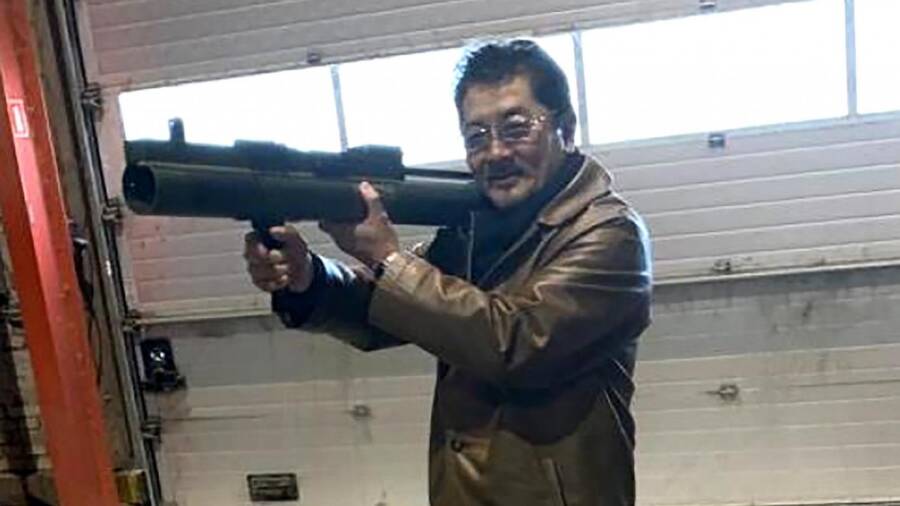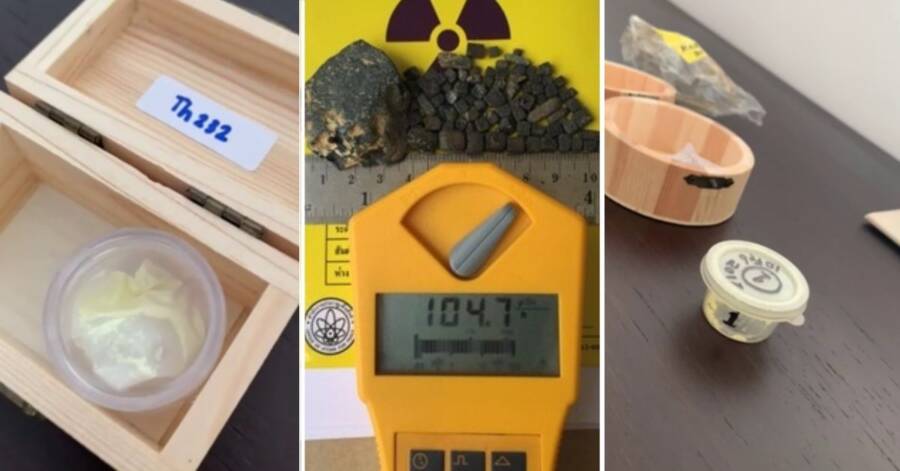Takeshi Ebisawa is accused of attempting to traffic nuclear materials. If found guilty, he could face life in prison.

United States Justice DepartmentTakeshi Ebisawa, the man accused of trafficking nuclear materials from Myanmar, handling a rocket launcher during a meeting with undercover agents.
The United States Department of Justice has charged Takeshi Ebisawa, a Japanese crime boss, with trafficking nuclear materials. Investigators claim he did so with the understanding that the materials would be used to develop nuclear weapons.
The 60-year-old man allegedly belongs to the Yakuza, an international crime syndicate operating primarily in Japan, Thailand, Sri Lanka, Myanmar, and the United States.
Currently, the crime boss is facing charges of conspiracy to commit international trafficking of nuclear materials, narcotics importation, money laundering, and conspiracy to acquire, transfer, and possess surface-to-air missiles. If found guilty, he could receive a life sentence.
The Investigation Of Takeshi Ebisawa Begins
According to a press release released by the United States Justice Department, Takeshi Ebisawa first caught the attention of the authorities in 2020 after disclosing to two undercover Drug Enforcement Agency Officers that he “had access to a large quantity of nuclear materials that he wanted to sell.”
More specifically, Ebisawa told the undercover agents that he had uranium and weapons-grade plutonium. He followed up his statements with images of the materials, even holding Geiger counters next to them to demonstrate their radioactivity.

United States Justice DepartmentPhotos that Ebisawa allegedly took of the nuclear materials.
The undercover agents told Ebisawa that they had connections to an Iranian general who might be interested in purchasing the materials, and Ebisawa agreed to a meeting.
“They don’t need it for energy, Iranian government need it for nuclear weapons,” the undercover agents told Ebisawa, according to a United States Justice Department report.
“I think so and I hope so,” Ebisawa allegedly replied.
In exchange for the nuclear materials, Ebisawa asked the agents for $6.85 million and a variety of weapons, including AK-47s, surface-to-air missiles, and tactical gear. He later revealed that he wished to purchase some of these illegal weapons for the leader of an insurgent leader in Myanmar — a man who is now considered a co-conspirator for his involvement in the scheme.
According to the government report, more unindicted co-conspirators became involved in the operation, telling the undercover agents that they had 2,000 kilograms of Thorium-232 and more than 100 kilograms of uranium and that they could produce as much as five tons of nuclear materials in Myanmar.
Authorities Shut Down The Illegal Operation
By February 2022, communications between the undercover agents, Takeshi Ebisawa, and his co-conspirators had come to a head. During that month, two co-conspirators met with the undercover agents at a hotel room in Thailand.
There, the co-conspirators allegedly showed the undercover agents two plastic containers with samples of the nuclear materials. The undercover agents took photos of the materials before the co-conspirators took them back to their office in Bangkok.
In May 2022, Thai authorities raided the office, collecting all of the radioactive material and handing it over to U.S. authorities. A U.S. forensic lab was later able to test the materials and confirm that they contained uranium and weapons-grade plutonium.
U.S. authorities arrested Takeshi Ebisawa in Manhattan in 2022. He is currently being held in a Brooklyn jail while awaiting his trial.
A co-conspirator in the case, 61-year-old Thai national Somphop Singhasiri, was arrested with Ebisawa and is facing drug and weapons charges.
“It is impossible to overstate the seriousness of the conduct alleged in today’s indictment,” Damian Williams, a U.S. Attorney in Manhattan, said in the press release.
“As alleged, the defendants in this case trafficked in drugs, weapons, and nuclear material — going so far as to offer uranium and weapons-grade plutonium fully expecting that Iran would use it for nuclear weapons,” stated Anne Milgram, administrator of the Drug Enforcement Administration. “This is an extraordinary example of the depravity of drug traffickers who operate with total disregard for human life.”
After reading about the Yakuza boss indicted for trafficking nuclear weapons, discover the true story of David Hahn, the “Nuclear Boy Scout” who built a nuclear reactor in his backyard. Then, dive into the history of the Yakuza, Japan’s most infamous crime syndicate.





